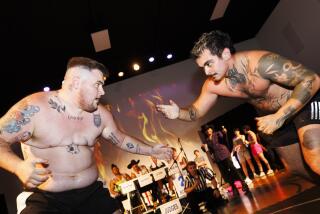Taking the stage the Homeboy way
- Share via
Born into a family of gangbangers, Alicia Cadena grew up knowing only a life of crime. At 16, she left home and joined a gang in Bell Gardens. She engaged in theft, landed in jail for four months and then started selling drugs. After she lost custody of her three children, she decided to turn her life around.
“I had been to different places — rehab centers and shelters,” she said. Then a friend told her about Homeboy Industries, the gang intervention center run by Father Gregory Boyle. “I only knew him as the guy who did tattoo removal.”
Cadena, 33, works in the Homeboy Cafe in downtown Los Angeles and is fighting to regain custody of her children. She will tell her story as part of “Tattoos on the Heart,” a new work for the stage loosely based on Boyle’s 2010 memoir. The stage piece will be presented for the first time Tuesday at the Ojai Playwrights Conference.
“Tattoos” will feature Boyle talking about his role as the founder of Homeboy Industries and his work with ex-gang members. His monologue will be interspersed with first-person accounts from those he has helped along the way.
“Is it theatrical? I don’t know. It’s storytelling,” said Boyle recently at Homeboy’s downtown headquarters. “It’s about kinship, an invitation to feel a level of compassion.”
Boyle has never performed professionally on stage, and neither have the “homies” who were recruited to join him. But the 57-year-old Jesuit priest is a born raconteur, able to bring a degree of warmth and even humor to his tales of urban brutality. He estimates that he gives 200 talks a year around the world, “so I know how to go off into the story land. I’ll just condense my material.”
No shortage of ideas
There’s plenty of material to go around. Homeboy Industries serves hundreds of ex-gang members each year through programs like job placement, education and legal aid. Its businesses include silk-screening, food services and a relatively new line of chips and salsa.
The “Tattoos” stage project was devised by Robert Egan, the artistic director of Ojai. Egan had worked with Homeboy Industries on fundraising projects, and after Boyle’s memoir was published, he asked the priest whether he would be interested in doing a special performance event.
Boyle compares the piece to the stage works of Spalding Gray or Garrison Keillor — verbally dense discourses with minimal staging. “The book is a collection of stories, and this won’t include every story,” he said. “Our hope is that we can communicate to the audience that there is no ‘us’ and ‘them.’”
Da’ja Harris, 18, said he isn’t nervous about sharing his life story in “Tattoos” but added that “I probably will be once I get on stage.”
Harris was born in prison while his mother was incarcerated in Chowchilla. He said he turned to the streets in the ninth grade after his mother died of an overdose.
For a few years, he engaged in robberies and sold marijuana and other drugs as part of a gang in Hawthorne. At 16, he decided to clean up and came to Homeboy Industries. He was offered a job at Homeboy, but in 2010 his position was eliminated as part of the company’s mass layoff during the recession. Earlier this year, he was rehired and has since gone from janitorial work to serving as an assistant to Boyle.
Harris said he now lives in his own apartment in Long Beach with his girlfriend and two young daughters. “I don’t go to my old neighborhood,” he said. “I don’t want to ever have to tell someone to take care of my daughters.”
The pros help out
To shape their stories for the stage, the “homies” are collaborating with two professionals, Marcia Berris, who works at the UCLA School of Public Affairs, and Andrew Shafer, the associate director of the Young Actors Studio.
Their job was to sit with each participant for weeks and turn their street stories into a workable theatrical script. “We want them to say things not in an obligatory way but in an engaging way,” Shafer said.
Wilfredo Lopez, 26, said he started hanging out with gangs while in grade school after his biological father was murdered. At 15, he was sentenced to jail for selling drugs and three years later, he was transferred to an adult prison. He was released in 2008, and for the next two years, he was in and out of jail for parole violation.
Last year, Lopez decided to turn his life around. “I just got tired,” he said.
He had first met Boyle at a juvenile camp when he was 12. He eventually found a job at Homeboy Industries, where he has worked a variety of jobs, including as a mental health assistant.
“Tattoos” runs about 80 minutes. There are no concrete plans for taking the show to other cities, but Boyle said there’s been interest in adapting his story for the screen. “It’s too early to tell where it’s going to go,” he said.
Boyle sees the stage show as yet another opportunity address a live audience. He said public speaking comes naturally to him. “I like doing it. I get energized,” he said.
More to Read
The biggest entertainment stories
Get our big stories about Hollywood, film, television, music, arts, culture and more right in your inbox as soon as they publish.
You may occasionally receive promotional content from the Los Angeles Times.











